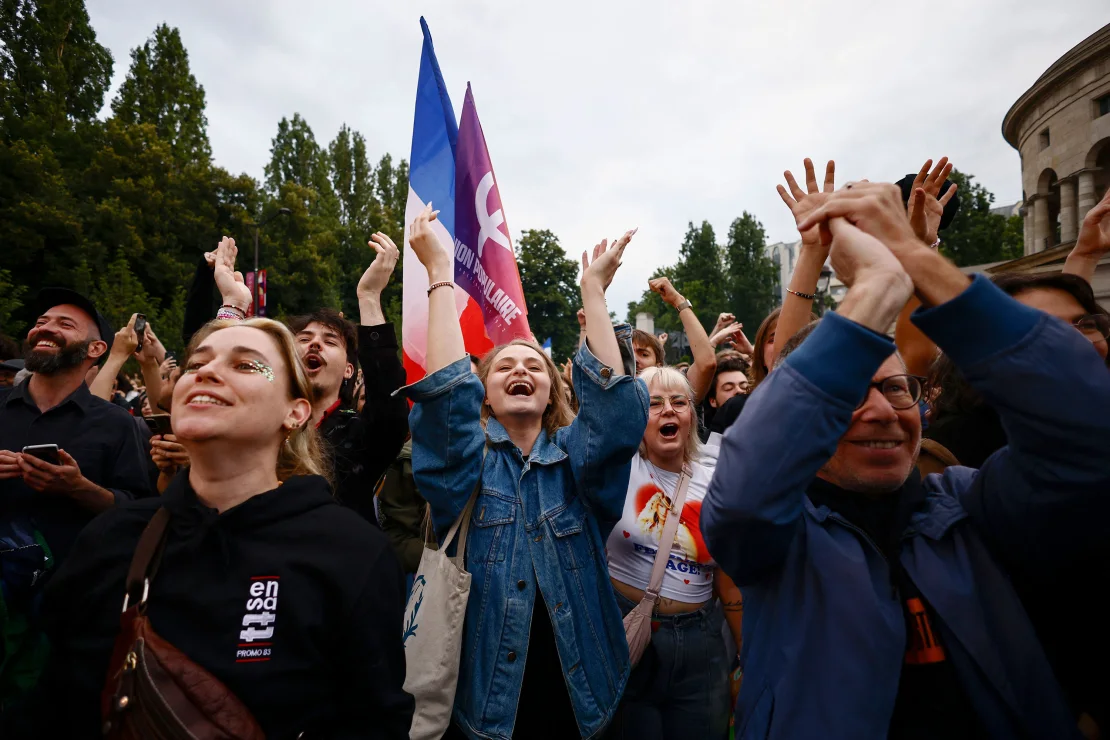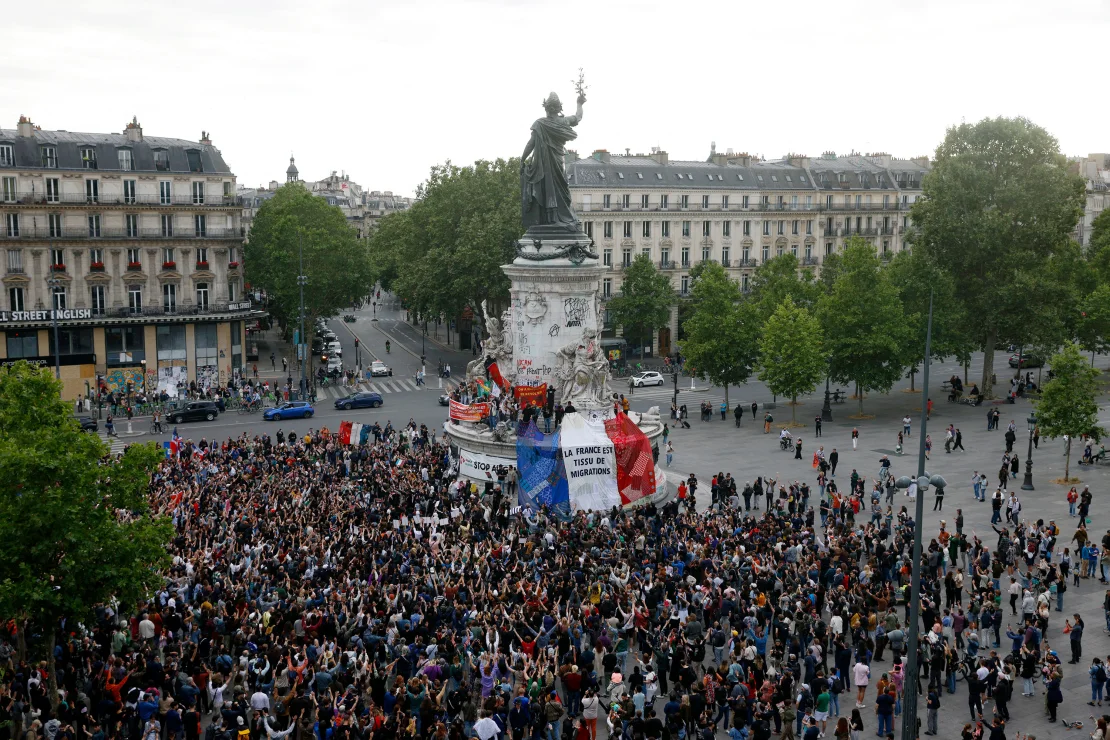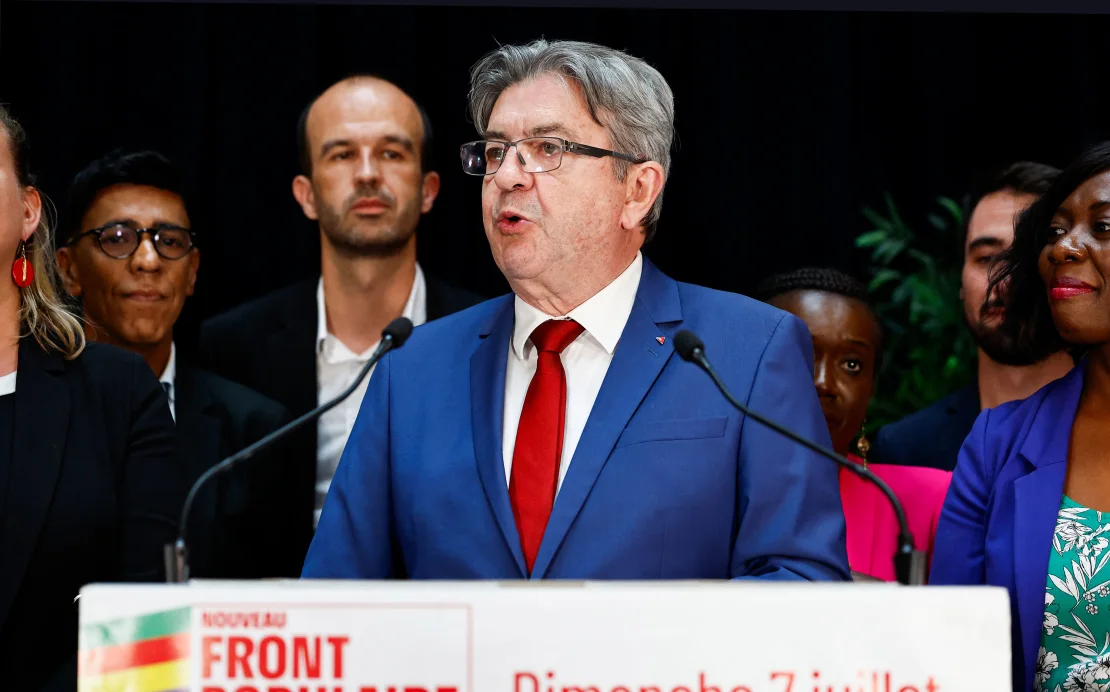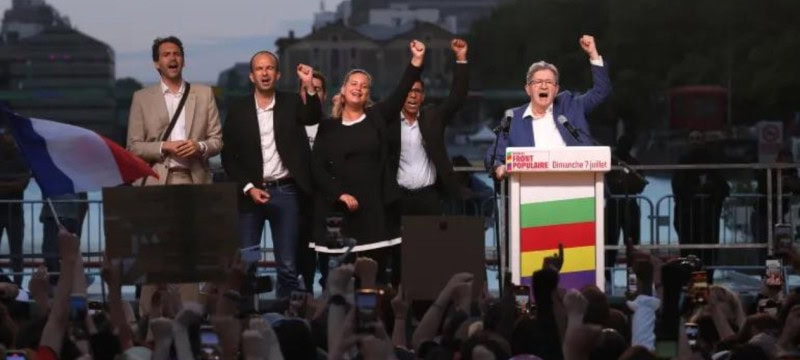In a French parliamentary election marked by strategic voting, a left-wing alliance emerged with the most seats but fell short of a majority, plunging France into political uncertainty. The New Popular Front (NFP), a coalition spanning from the far-left France Unbowed to more moderate Socialists and Ecologists, secured 182 seats, making it the largest bloc but well below the 289 needed for a majority, according to the French Interior Ministry.
Emmanuel Macron’s centrist Ensemble alliance, rebounding from a poor first-round showing, garnered 163 seats, while Marine Le Pen’s far-right National Rally (RN) and its allies secured 143 seats despite leading initially.
Read more: Labour Party Resounding Win Ends 14-Year Conservative Rule In Britain
The RN’s strong performance in the first round had raised concerns about a potential far-right government, reminiscent of Vichy France during World War II, but subsequent tactical voting aimed at thwarting the RN led to unexpected results and a hung parliament.
After over 300 seats went to a three-way runoff, more than 200 centrist and left-wing candidates withdrew to consolidate support. The outcome sparked celebrations in Paris, where Jean-Luc Mélenchon of France Unbowed hailed it as a victory against extremism and praised civic mobilization.
In response to the results, Gabriel Attal, a protege of Macron, announced his resignation as prime minister, criticizing the decision to dissolve parliament. Meanwhile, at an RN event, leader Jordan Bardella expressed disappointment, vowing uncompromising opposition to left-wing policies, particularly on immigration.
France now faces a period of uncertainty as parties negotiate potential coalitions amid a fragmented political landscape.

An expediently formed coalition
The Elysee Palace issued a brief statement indicating that Macron is awaiting the complete results of all 577 constituencies “before making necessary decisions.” As the guardian of French institutions, the president will ensure the people’s sovereign choice is respected.
Following parliamentary elections, the French president traditionally appoints a prime minister from the party with the most seats, typically the president’s own party. However, with Sunday’s results, Macron faces the potential need to appoint a figure from the left-wing coalition, a scenario known as “cohabitation,” which is rare.
Addressing supporters near Stalingrad square, Mélenchon emphasized that Macron “must summon the New Popular Front to govern.”

However, it remains unclear which party within the coalition Macron will choose to appoint a prime minister from. France Unbowed secured 74 seats, making it the largest single party within the NFP, surpassing the Socialists with 59 seats.
Macron and his allies have consistently stated their refusal to form a coalition with Mélenchon’s France Unbowed. Following the first round of elections last Sunday, outgoing Prime Minister Gabriel Attal, a protege of Macron, criticized France Unbowed for hindering the formation of a “credible alternative” to the far right.
The NFP was formed less than a month ago after Macron called for snap elections following his party’s significant loss to the RN in last month’s European Parliament elections. The coalition, which is expansive and potentially contentious, chose its name in an effort to evoke the original Popular Front that prevented the far right from gaining power in 1936. The election results on Sunday indicate that the NFP has achieved a similar feat once again.
During its campaign, the coalition advocated for raising the minimum monthly wage to 1,600 euros (over $1,700), implementing price caps on essential goods, electricity, fuel, and gas, and reversing Macron’s unpopular pension reform, which increased the French retirement age from 62 to 64, already one of the lowest in the Western world.

A situation caused by Macron?
Sunday’s election marks a triumph for the French “cordon sanitaire,” where mainstream parties unite to prevent the far right from seizing power.
However, the RN’s significant gains should not be underestimated. In 2017, during Macron’s initial election victory, the RN secured just eight seats. By 2022, this number surged to 89 seats, and in the latest vote, they secured 125 seats, making them the largest single party in parliament.
While the immediate threat of a far-right government has been averted, these elections have plunged France into political uncertainty. Macron’s decision to call early elections, shortly after his party’s defeat in the EU election, aimed to respond to voter sentiments and clarify the political landscape.
However, Sunday’s outcome adds complexity to France’s political landscape. With no possibility of calling new elections for another year and three years remaining in his presidential term, Macron faces the challenge of governing amidst a divided parliament and mounting domestic and international issues.
Édouard Philippe, Macron’s ally and former prime minister, acknowledged that Macron’s gamble has exacerbated the situation. He emphasized the need for central political forces to remain steadfast and work towards stabilizing the political environment through constructive agreements.









